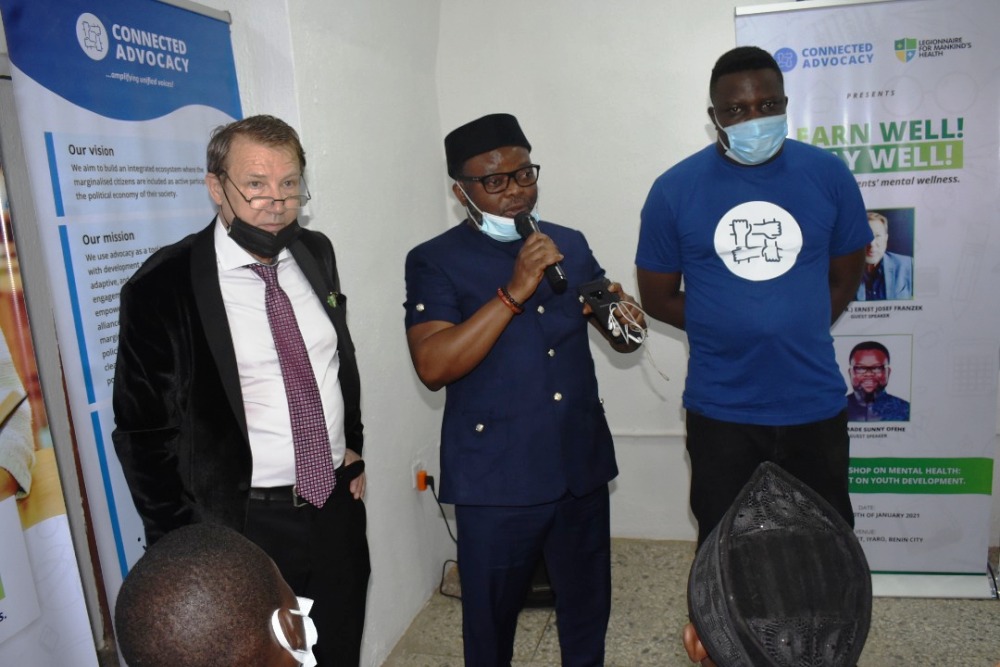FEATURED
How Students Can Avoid Becoming Suicidal – Stakeholders

Experts, Stakeholders have proffered solution to how students can avoid being suicidal as they return to school to face the rush of academic pursue occasioned by the global coronavirus pandemic.
BIGPENNGR.COM reports that they spoke at a one day workshop with the theme “Learn Well, Stay Well”, organised by Connected Advocacy in conjunction with Legionnaire for Mankind’s Health based in The Netherlands in Benin City, the Edo state capital.
The programme was package at the weekend with the aim of helping students understand and survive the mental drain in their various universities at this critical period.
Speaking at the event, Professor Ernst Josef Franzek, a consultant Neurology, Psychiatry and Psychotherapy, said that suicide is not a solution but an end point.
He said that suicide should not be an option for one to get out of depression, addiction or psychological issues.
Professor Franzek, who is the founder/Chief Executive Officer of the Netherlands-based Non-governmental organisation, Legionnaire for Mankind’s Health, said that people nurse suicidal feelings when they begin to lost their ability to communicate with the environment.
According to him, when an active person suddenly becomes inactive, withdrawn and isolated, there are high risk that such a person may commit suicide, saying that constant engagement with the outside world could help to overcome ones problems and ease out suicidal feelings.
He admonished students to always engaged themselves by forming cluster reading groups, particularly during examinations period to avoid running into depression, having mental fatigue.
The university don, also urged students to avoid hard drugs and excessive alcohol intake, saying that suicidal thoughts can become even stronger if you have taken drugs or alcohol.
In the same vein, the Executive Secretary of Legionnaire for Mankind’s Health who doubled as Chief Executive Officer of Hope for Niger Delta Campaign, (HNDC), Comrade Sunny Ofehe, shared his “grass to grace” experience as students of the university of Benin to motivate the students to always remain resilience in time of difficulties.
Ofehe, a one-time governorship aspirant in Delta state, said that no matter the challenges one faces in life, the thought of suicide should not be an option, urging students to always let their goals be their driving force.
Also, speaking, the Board of Trustees chairperson of Connected Advocacy, Dr. Georgina Erifeta, said that the theme of the programme was apt, saying that the NGO has already set up a platform that would help raise awareness against becoming suicidal on campus.
Dr Erifeta who is a senior lecturer of the Department of Biochemistry, Igbinedion University, Okada, urged students never to contemplate taking their lives when they face challenges and difficulties, saying it is better to share ones suicidal thoughts and feelings with a trusted family member, friend or therapist, she admonished.
In her goodwill message, Oluronke Ojeikere, Board Member, Connected Advocacy and Initiator/Executive Director, Society To Heighten Awareness of Women And Children Abuse (SOTHAWACA), highlight the need for constant awareness campaign by stakeholders, saying that suicidal thoughts and feelings can be managed and totally erased.
Earlier, the Executive Director of Connected Advocacy, Prince Israel Orekha, said that the “Learn Well, Stay Well” programme was package as part of the NGO’s activities to promote students mental well being this period of rush examinations occasioned by the global coronavirus pandemic.
According to him, Connected Advocacy, a youth-led organisation has been in the forefronts of campaign to strengthening and empowering marginalised communities through sustainable developmental interventions, and collaborative advocacy for better government policies.
Orekha said that since inception in 2016, “We have used advocacy as a tool to connect marginalised citizens with development partners, and policymakers to develop an adaptive, and accountable strategy, for effective stakeholder engagement.
“We do this through sustainable intervention, empowerment, communication, knowledge exchange, alliance building, innovation, and public awareness”.
He said that Connected Advocacy was partnering with The Netherlands-based NGO, Legionnaire for Mankind’s Health, in its “Learn Well, Stay Well” programme, which is tailored at helping students understand and survive the mental drain in their various universities.
Orekha said that the University of Benin is currently being use as a pilot project for the programme which would be extended to other tertiary institutions.
BIGPENNGR.COM reports that more than 264 suicide cases as at September 2020 had been recorded in the country within the last 4 years, according to Daily Trust report.
A recent case of suicide that had buzzed the internet for days was that of a Warri-based singer, Starboy Fizzy, who took his life by drinking a poisonous substance.
Reports say the incident happened after the victim returned from a church vigil with his mother.
According to reports, the young man decided to end his life because the pastor of the church allegedly told his mother that he saw a vision that her son, the deceased, would use her for money ritual.
Reports say the mother of the deceased divulged the pastor’s warning to her neighbours to the displeasure of her son as people began to talk about it.
Weighed down by the gossips doing the rounds about the pastor’s revelation, the upcoming artist allegedly got depressed and went to ingest the pesticide to terminate his life.




















